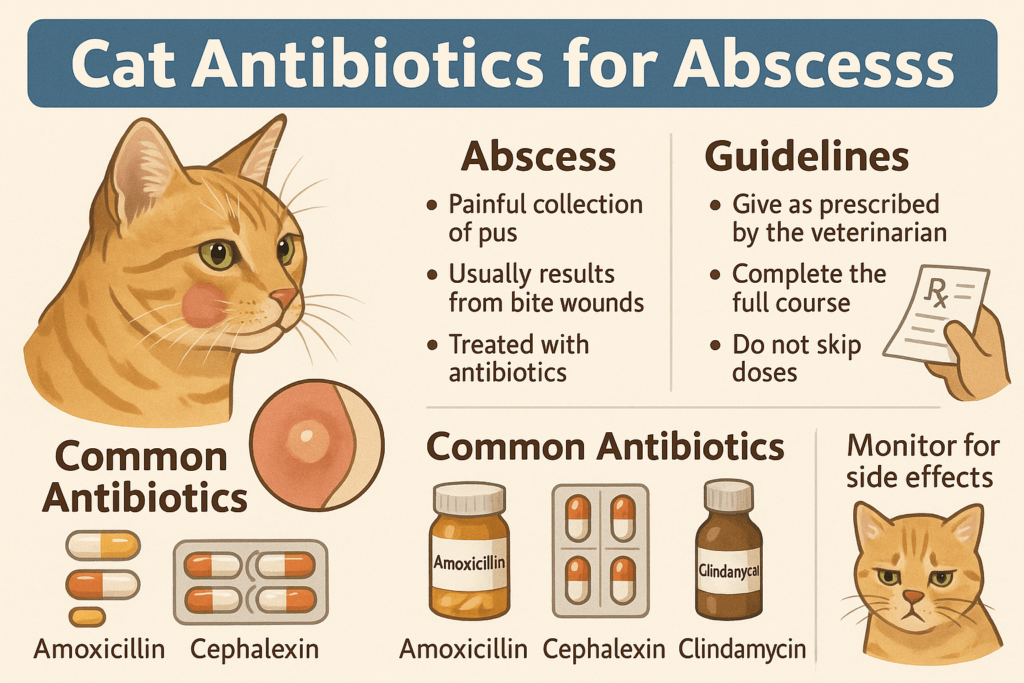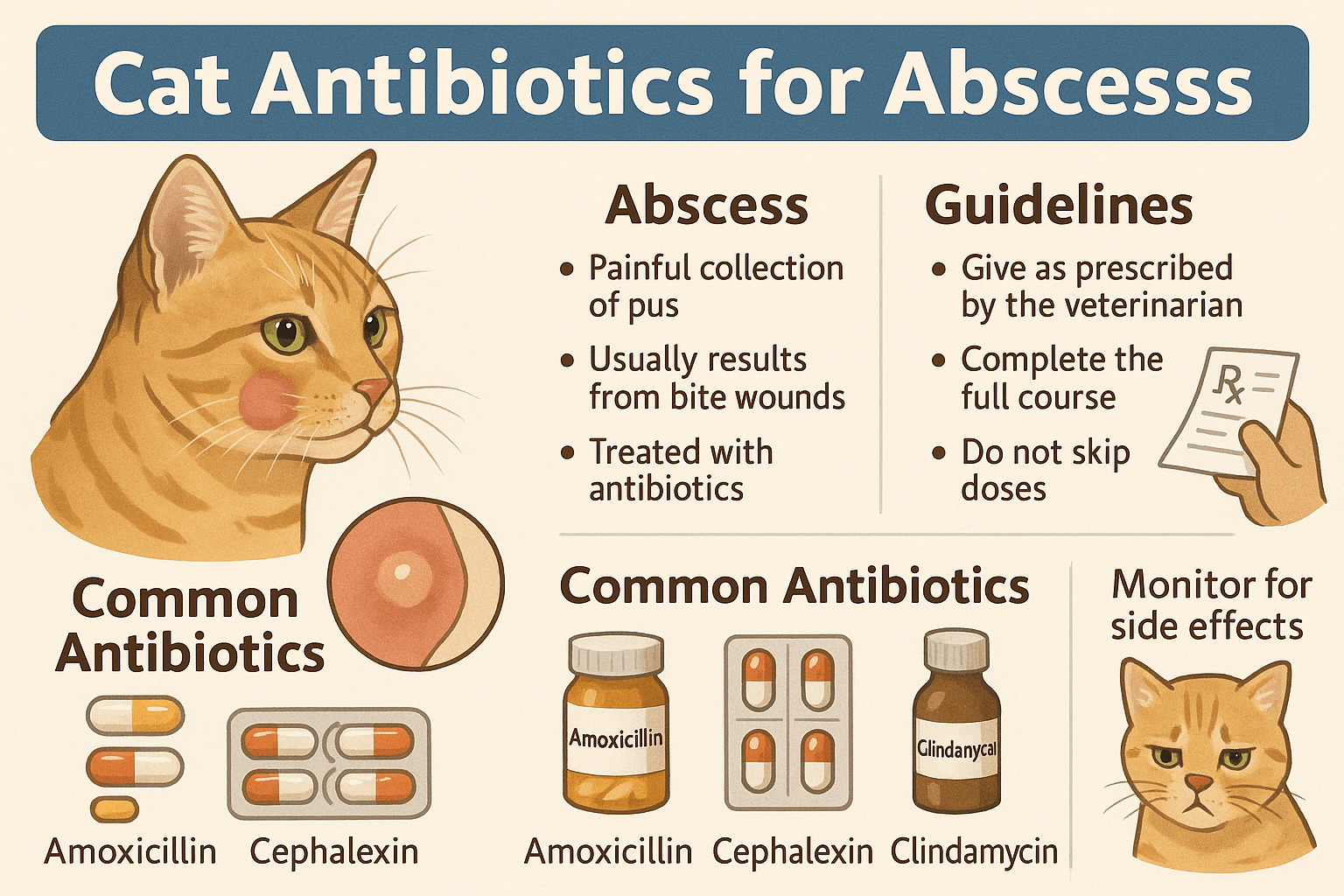Cat Antibiotics for Abscess: What You Need to Know
Abscesses in cats are painful, swollen pockets of pus that often result from bacterial infections. These infections can occur due to fights with other animals, bites, scratches, or even minor injuries that become infected. While abscesses may seem alarming, they are treatable with proper care and medication, including antibiotics. Understanding how cat antibiotics work, when they are necessary, and what steps to take can help you ensure your feline friend recovers quickly and comfortably. In this article, we’ll explore everything you need to know about managing abscesses in cats, from symptoms to treatment options.
Expert Insight on Cat Abscesses
“A cat abscess is a wound that becomes infected, leading to pus accumulation beneath the skin. Abscesses are often swollen, painful to the touch, and make affected kitties feel really uncomfortable.”
Signs Your Cat May Have an Abscess
Recognizing the signs of an abscess early is crucial for prompt treatment. Cats are masters at hiding pain, so it’s important to stay vigilant and look for subtle changes in their behavior or appearance.
Swelling Under the Skin:
Abscesses often appear as soft, warm lumps beneath the skin, commonly found on the face, neck, or limbs.Lethargy and Loss of Appetite:
A cat with an abscess may seem unusually tired or disinterested in food due to discomfort or fever.Excessive Licking or Chewing:
Cats frequently lick or chew at the affected area in an attempt to relieve pain or irritation.Discharge or Drainage:
If the abscess ruptures, you may notice pus, blood, or fluid leaking from the wound.Behavioral Changes:
Aggression, hiding, or reluctance to be touched can indicate pain caused by an abscess.
If you notice any of these symptoms, it’s essential to consult a veterinarian promptly to prevent complications and begin appropriate treatment.

Common Antibiotics Used for Cat Abscesses
Veterinarians often prescribe antibiotics to treat abscesses in cats, as they help eliminate the underlying bacterial infection. Here are some of the most commonly used antibiotics and their purposes.
Amoxicillin-Clavulanic Acid (Clavamox):
This broad-spectrum antibiotic is highly effective against many types of bacteria commonly found in abscesses.Cephalexin:
Often prescribed for skin infections, cephalexin works well for abscesses caused by gram-positive bacteria.Enrofloxacin:
A stronger antibiotic reserved for more severe infections, enrofloxacin targets both gram-positive and gram-negative bacteria.Clindamycin:
Known for its effectiveness against anaerobic bacteria, clindamycin is frequently used for deep tissue infections like abscesses.Penicillin-Based Drugs:
These antibiotics are sometimes used for mild abscesses but may require additional medications for resistant infections.
Each antibiotic has specific uses and potential side effects, so it’s critical to follow your vet’s recommendations closely.
Check this guide 👉Can I Give My Cat Human Antibiotics? Best 7 Expert Tips!
Check this guide 👉Natural Antibiotics for Cats: Best 7 Expert Tips!
Check this guide 👉Understanding Cat Anti-Anxiety Medication: Best 7 Tips!
Antibiotic Options for Abscesses | Key Considerations Before Use |
|---|---|
Amoxicillin-Clavulanic Acid | Broad-spectrum; safe for most cats |
Cephalexin | Effective for gram-positive bacteria |
Enrofloxacin | Stronger option; reserved for severe cases |
Clindamycin | Targets anaerobic bacteria effectively |
Penicillin-Based Drugs | May require combination therapies |
Steps to Treat an Abscess at Home After Veterinary Care
While professional veterinary care is essential, there are steps you can take at home to support your cat’s recovery after receiving antibiotics or drainage treatment.
Clean the Area Gently:
If instructed by your vet, gently clean the abscess site with a saline solution or antiseptic wipes to prevent further infection.Monitor the Wound Daily:
Keep an eye on the abscess to ensure it doesn’t reopen or show signs of worsening, such as increased swelling or discharge.Administer Medications as Directed:
Follow your vet’s dosage instructions carefully and complete the full course of antibiotics, even if the abscess appears healed.Provide a Quiet Recovery Space:
Give your cat a calm, comfortable area to rest away from other pets or stressors during their healing process.Watch for Side Effects:
Some cats may experience vomiting, diarrhea, or loss of appetite while on antibiotics. Contact your vet if these symptoms occur.
By following these steps, you can help your cat recover faster and reduce the risk of complications.
Preventing Future Abscesses in Cats
Prevention is key to avoiding abscesses and the need for antibiotics in the future. Taking proactive measures can protect your cat from painful infections.
Supervise Outdoor Activities:
Limit unsupervised outdoor time to reduce the risk of fights or injuries that could lead to abscesses.Neuter or Spay Your Cat:
Altered cats are less likely to engage in territorial fights, which are a common cause of abscesses.Check for Injuries Regularly:
Inspect your cat’s skin for bites, scratches, or wounds, especially if they spend time outdoors.Keep Vaccinations Up-to-Date:
Vaccines like those for feline leukemia and rabies can help prevent infections that may lead to abscesses.Discourage Aggressive Behavior:
If your cat interacts with other animals, monitor their behavior to minimize conflicts and potential injuries.
By implementing these preventive strategies, you can significantly lower the chances of your cat developing another abscess.
Complications That Can Arise from Untreated Abscesses
If left untreated, abscesses can lead to serious health complications for your cat. Recognizing these risks highlights the importance of seeking prompt veterinary care.
Systemic Infection (Sepsis):
Bacteria from the abscess can enter the bloodstream, leading to a life-threatening condition called sepsis.Tissue Necrosis:
Prolonged infection can damage surrounding tissues, resulting in permanent scarring or loss of function.Chronic Pain and Discomfort:
Untreated abscesses can cause ongoing pain, making it difficult for your cat to eat, move, or rest comfortably.Spread of Infection to Internal Organs:
In rare cases, infections can spread to vital organs like the liver or kidneys, causing severe illness.Delayed Healing and Scarring:
Without proper treatment, abscesses may take much longer to heal and leave behind unsightly scars.
Addressing abscesses early prevents these complications and ensures a smoother recovery for your cat.
How to Administer Antibiotics Safely
Giving your cat antibiotics correctly is crucial for successful treatment. These tips will help you administer medications safely and effectively.
Use a Pill Dispenser or Hide Pills in Food:
Many cats resist taking pills directly. Use a pill dispenser or hide the medication in treats or wet food.Avoid Mixing with Essential Medications:
Never mix antibiotics with other medications unless specifically instructed by your vet.Stick to the Prescribed Dosage:
Giving too little or too much can reduce the medication’s effectiveness or harm your cat.Reward Your Cat Afterward:
Offer praise, treats, or playtime to create positive associations with taking medication.Track Progress and Report Issues:
Keep a log of your cat’s symptoms and report any concerns to your vet promptly.
Proper administration ensures your cat benefits fully from the prescribed antibiotics.
Alternative Treatments to Support Healing
While antibiotics are the primary treatment for abscesses, complementary therapies can aid in your cat’s recovery. These options work alongside veterinary care to enhance healing.
Warm Compresses:
Applying a warm, damp cloth to the abscess site can reduce swelling and promote drainage.Natural Supplements:
Probiotics may help maintain gut health during antibiotic treatment, reducing the risk of digestive upset.Hydration and Nutrition:
Ensure your cat stays hydrated and eats nutrient-rich foods to support their immune system.Pain Management:
Your vet may prescribe pain relievers to keep your cat comfortable during recovery.Herbal Remedies (Under Vet Guidance):
Certain herbs, like echinacea or calendula, may boost immunity or aid healing when used cautiously.
Combining these supportive measures with antibiotics can accelerate your cat’s recovery and improve overall well-being.
Frequently Asked Questions About Cat Antibiotics for Abscesses
How long does it take for an abscess to heal?
With proper treatment, most abscesses heal within 7-10 days, though deeper infections may take longer.
Can I give my cat human antibiotics?
No, human antibiotics can be toxic to cats. Always use medications prescribed by a veterinarian.
What should I do if the abscess bursts?
Clean the area gently and contact your vet immediately to ensure proper care and prevent further infection.
Are antibiotics always necessary for abscesses?
In most cases, yes. However, minor abscesses may resolve with drainage and cleaning under veterinary supervision.
Can abscesses recur after treatment?
Yes, especially if the underlying cause (like fighting) isn’t addressed. Preventive measures can reduce recurrence risks.
Ensuring Your Cat’s Health and Comfort
Abscesses in cats can be painful and concerning, but with timely veterinary care and the right antibiotics, your feline companion can recover fully. Understanding the signs, treatment options, and preventive measures empowers you to keep your cat healthy and happy. Remember, your vet is your best resource for addressing abscesses and ensuring your cat receives the best possible care. By staying informed and proactive, you can help your furry friend avoid unnecessary discomfort and enjoy a long, thriving life.
Canned Pumpkin for Cat Diarrhea: Best 7 Expert Tips! Natural remedy to firm stools, soothe upset bellies, and support gut health safely.
Can a Cat Give You Scabies? Best 7 Expert Tips! Discover the truth about feline mites, human skin risks, and how to protect yourself—without panic.
Cat Flea vs Human Flea: Best 7 Expert Tips! Discover the truth about bites, species, and how to eliminate infestations for good.
Weird Cat Behaviors: Best 7 Expert Tips! Discover why cats do strange things—and how to understand, not punish, their instincts for a happier home.





